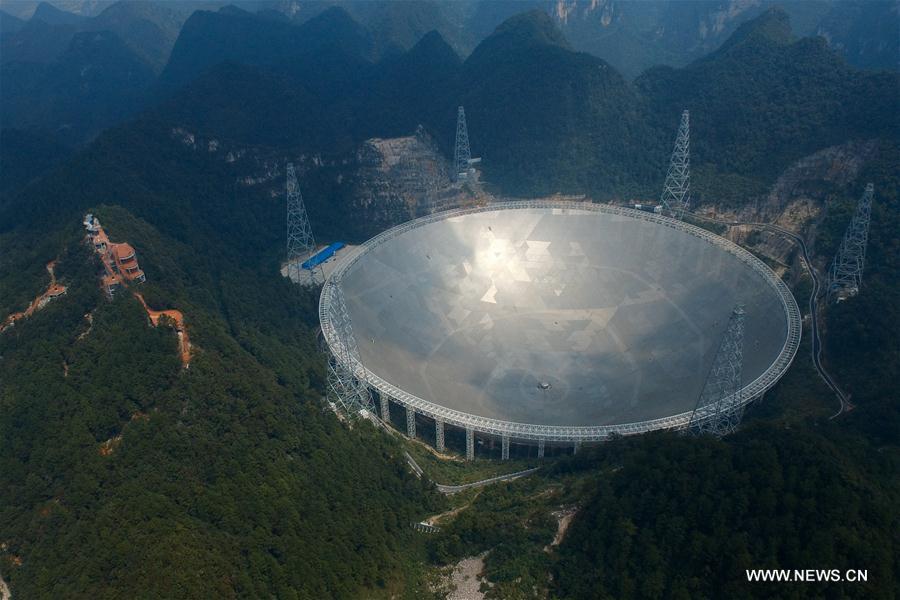

 |
| Photo taken on Sept. 24, 2016 shows the 500-meter Aperture Spherical Telescope (FAST) in Pingtang County, southwest China's Guizhou Province. The FAST, world's largest radio telescope, measuring 500 meters in diameter, was completed and put into use on Sunday. (Xinhua/Ou Dongqu) |
WASHINGTON, Sept. 24 (Xinhua) -- China's 500-meter Aperture Spherical Radio Telescope (FAST) may help better understand the origin and structure of the universe and accelerate and even revolutionize the search for life beyond Earth, a renowned U.S. alien intelligence expert said Saturday.
FAST, the world's largest single-dish telescope with a diameter of a half kilometer, is expected to go online on Sunday. It is located at the Dawodang depression, a natural basin or "karst" in Pingtang County in the mountainous southwestern Chinese province of Guizhou.
The telescope, nicknamed Tianyan, or the Eye of Heaven, can accurately image twice as much the sky as the Arecibo Observatory in Puerto Rico, which had previously been the world's largest single-dish radio telescope, with double sensitivity and five to 10 times the surveying speed.
Douglas Vakoch, president of METI International, an organization promoting messaging outer space in the search for extraterrestrial intelligence, noted that astronomers worldwide will be invited to use the facility through a competitive review of observing proposals.
"By opening FAST to use by the broader international community, China is demonstrating its commitment to fostering astronomy as a global scientific enterprise," he told Xinhua, saying it may lead to "discoveries beyond our wildest imagination."
As for FAST's scientific missions, Vakoch said it will be used to look for the signatures of complex organic molecules in interstellar space, which will show how widely the basic building blocks of life are distributed throughout the cosmos.
"For over a half century, astronomers have been using radio telescopes to answer the haunting question, 'Are we alone?' But astronomers face a daunting challenge: the signals they seek are so weak that an incredibly sensitive telescope is needed to detect them," he said.
"FAST's innovative design and huge collecting area give it unsurpassed speed and sensitivity, making it vital to the search for extraterrestrial intelligence in the coming decades," said Vakoch. "We can expect China to become a world leader in the search for extraterrestrial intelligence because of its demonstrated commitment in building FAST."
However, FAST will not initially be outfitted with the signal processing capabilities to search for aliens, he said. This technology will be added at a later stage, and when that happens, FAST will be able to scan the heavens for signals that "can't be created by nature, but only by advanced civilizations," Vakoch said.
Based on the recent history of radio telescopes, he also predicted that FAST will lead to "a dramatic increase in the number and variety of pulsars discovered." Pulsars, one of FAST's main scientific objectives, are dense, rotating stars that act as cosmic clocks, emitting pulses with remarkable regularity.
This could also provide scientists with the capability to detect gravitational waves, or ripples in space-time, from pairs of massive black holes, since FAST has the potential to precisely measure tiny changes of the pulsing rates of pulsars as the gravitational waves pass by.
Vakoch highlighted FAST's role in underpinning China's space program, noting that China has made great breakthroughs in space exploration, such as putting humans into Earth orbit and having taikonauts to dock with an orbiting module as a first step toward developing a Chinese space station.
"With the opening of FAST, China continues to demonstrate that it is a world leader in space exploration, now from an Earth-based observatory as well as from space," he added. "Astronomers around the world can be grateful to China for creating an observatory that may lead to discoveries beyond our wildest imagination."
Day|Week

 Who Will Fit The Chinese Roles In Game Of Thrones?
Who Will Fit The Chinese Roles In Game Of Thrones? China's Hubei Shennongjia added to World Heritage List
China's Hubei Shennongjia added to World Heritage List Cute Dog At Fruit Stand Becomes Latest Internet Sensation
Cute Dog At Fruit Stand Becomes Latest Internet Sensation Top 10 livable Chinese cities
Top 10 livable Chinese cities The last primitive tribe in China
The last primitive tribe in China China's first intelligent security robot debuts in Chongqing
China's first intelligent security robot debuts in Chongqing A Total of 3,552 Subscribers Vanish In Two Days; YouTube Closes All Doors to Users’ Inquiries
A Total of 3,552 Subscribers Vanish In Two Days; YouTube Closes All Doors to Users’ Inquiries Out of this world! Futuristic UFO-shaped yacht has its own garden and a stunning underwater viewing deck
Out of this world! Futuristic UFO-shaped yacht has its own garden and a stunning underwater viewing deck An old tea house in Chengdu
An old tea house in Chengdu Furious Customer Crushes All the Buns from Vendor Just Because He Was Given the Wrong Flavor
Furious Customer Crushes All the Buns from Vendor Just Because He Was Given the Wrong Flavor